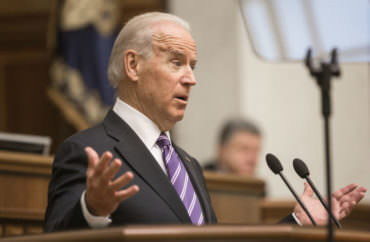 Unlike ‘wall-to-wall coverage for Brett Kavanaugh, Donald Trump’
Unlike ‘wall-to-wall coverage for Brett Kavanaugh, Donald Trump’
Leading Democratic presidential candidate Joe Biden made his name in the past decade as a tireless champion of denying due process to students accused of sexual misconduct, devising the Obama administration’s so-called guidance that it treated as binding regulation.
Now that he’s been accused of sexual assault by a former employee – an accusation that drew little legacy media coverage – some Democratic student groups are showing their consistency on the issue.
The University of Pennsylvania’s Penn Democrats and Penn for Bernie demanded that Biden’s campaign and mainstream media outlets investigate the allegations by Tara Reade, his former Senate staffer, The Daily Pennsylvanian reports.
Left-wing outlets Vox and The Intercept have run lengthy articles in the past week on the cold shoulder Reade has received since she aired a more narrow version of her allegations a year ago, accusing Biden of inappropriately touching her shoulder and neck.
They were largely in line with allegations by a former Nevada lawmaker, Lucy Flores, but the sudden wave of claims against Biden were not enough to make Penn reconsider naming its new Washington, D.C.-based center after him.
MORE: Penn silent on whether it will rename Penn Biden Center
If the elite Ivy League Democrats are any indication, perhaps Biden should start worrying that he’s losing the narrative:
In a written statement to The Daily Pennsylvanian, Penn Dems executive board expressed that they take allegations of sexual assault “extremely seriously,” and reference their status as a group certified by Penn Violence Prevention’s Anti-Violence Engagement Network.
“Tara Reade deserves to be heard and journalistic organizations have an obligation to investigate her allegations,” the statement read. “VP Biden should also address them further immediately.” …
Co-director of Penn for Bernie and College sophomore Jack Cahill said sexual assault allegations should always be treated seriously, regardless of political party.
“If you believe in women, and if you want to hold people accountable, you have to be morally and ideologically consistent, regardless of whether it’s somebody you know, or whether they have a D or an R next to their name,” Cahill said. ‘“If Bernie Sanders had a credible allegation against him, I would be very vocal, Penn for Bernie would be very vocal, and calling for an investigation about this.”
MORE: Biden compares advocates of due process to ‘Nazis’
One of Cahill’s colleagues is even more vocal, chastising reporters for ignoring accusations against the more mainstream Democratic candidate:
Emily Liu, a College junior and Penn for Bernie’s Outreach Director, criticized the lack of coverage on Reade’s allegation in major media outlets. At the time of publication, Reade’s allegation against Biden has not been covered by The New York Times, The Washington Post, or CNN.
“I haven’t seen basically any major media outlets cover this, the way there was wall-to-wall coverage for Brett Kavanaugh, Donald Trump, basically anyone possible,” Liu said. “The standard should be applied evenly across the board, especially from organizations like CNN or Time’s Up who have a responsibility to hold the powerful accountable.”
Time’s Up – a nonprofit within the anti-due process National Women’s Law Center – turned down Reade’s request for legal help when she wanted to expand her allegation. It cited its tax-exempt status and Biden’s political candidacy, but The Intercept pointed out another coincidence: The managing director of the nonprofit’s PR firm is a top Biden advisor, Anita Dunn.
A tax professor at Loyola Law School Los Angeles discounted the tax-exempt status rationale, telling the media outlet that Time’s Up is “allowed to continue to do what they have always done” with regard to evaluating which cases to take. (Some colleges also ban students from expressing political messages, disingenuously citing their tax-exempt status.)
Biden’s campaign has denied the allegation, telling reporters (for perhaps the first time ever) that they “have an obligation to rigorously vet” claims by sexual assault accusers.


